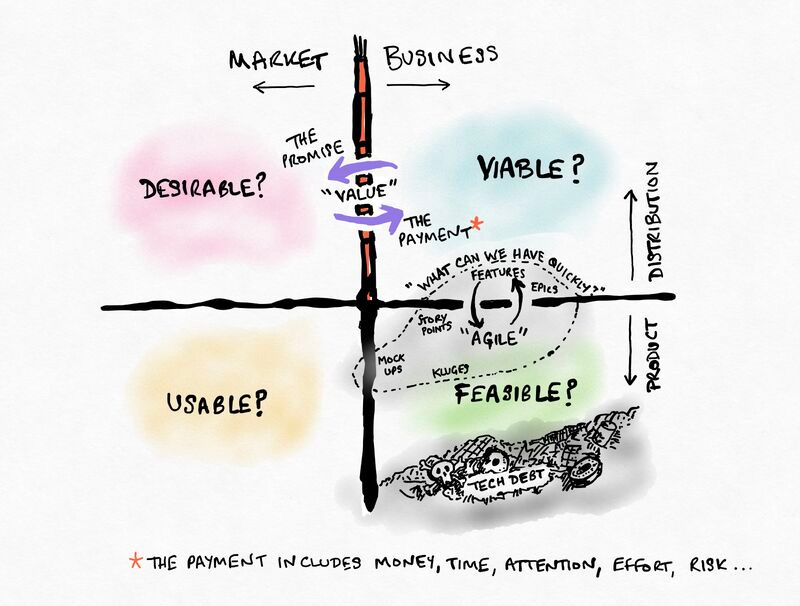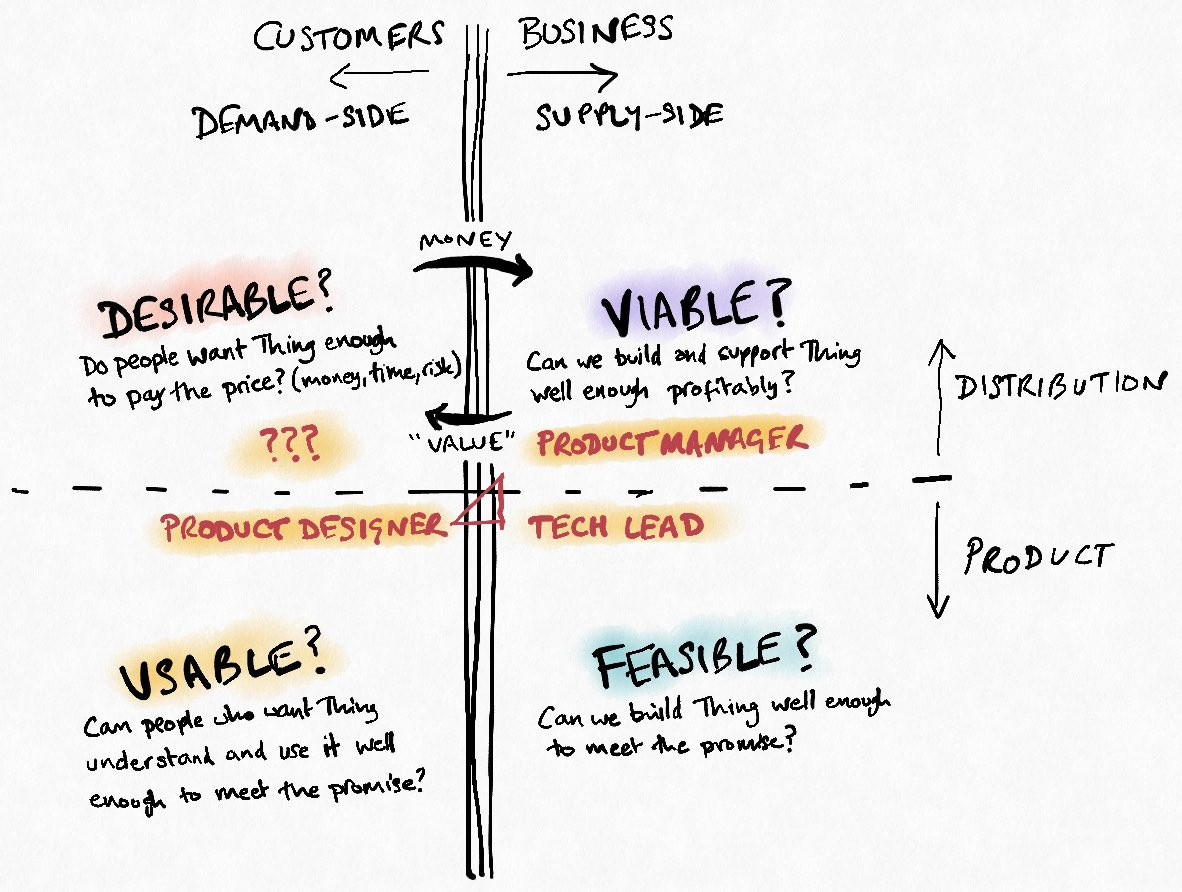We need to talk about Airbnb
Product managers are out. Or are they?
Brian Chesky (CEO of Airbnb) announced they were getting rid of product managers, and 10,000 designers cheered …
If you haven’t yet heard the buzz from Figma’s Config conference, or listened to Lenny’s podcast featuring Brian, I’m sure the news will waft in your direction sooner or later.
This all reminded me of a 2x2 I’ve been noodling with for a couple of years. People on Linkedin seemed to like it, so I wanted to share it with you.
Read on to find out:
how Airbnb didn’t actually “get rid” of product management
how the role of taste plays into what happened (along with comfort and control)
my bet for where all this goes next
1) Airbnb didn’t get rid of product managers. It yanked them back to their traditional role, and out of the “agile” whirlpool
Here’s my 2x2 that I mentioned. (I shared an earlier version of this on Twitter in Feb 2022.)
I see what Chesky did as yanking product managers away from the Viable/Feasible negotiation boundary (labelled “Agile”) over to the Desirable/Viable negotiation boundary (labelled “Value”).
This is closer to a traditional role that product managers have played: much more involved in marketing and distribution.
I’m not cheering about getting rid of product managers, but I am cheering for rewilding the role into something with a remit that includes distribution.
Sure, in theory — in theory — product managers on empowered teams are already juggling all the quadrants on my 2x2. And I’ve worked with a handful of brilliant individuals who do.
But in practice, that “agile” negotiation boundary forms a whirlpool in many businesses that sucks attention and resources towards it.
When stuff isn’t getting shipped as fast as it used to, that hurts RIGHT NOW, and people’s jobs are on the line. Product managers get caught in that whirlpool and sucked down into debates about prioritising lists of features.
Meanwhile, the marketing/sales (aka distribution) aspects are passed off to other departments, often with ways of working that clash with product building. This has led to some orgs creating a separate role — product marketing — designed to paper over the chasm.
But what’s shipped and why it’s desirable are intrinsically intertwined: it turns out you can’t separate them.
I think Chesky saw that, and fixed it. In a big, company-changing way.
And it’s interesting how he fixed it by re-jigging the product trio.
Two years ago I mused: “does the classic ‘product trio’ need to include a fourth member who understands marketing/distribution?”
See, desirability is often considered part of the designer’s remit. But most designers aren’t distribution-aware. And some even get wrongfooted by believing that the market should desire what’s desirable to designers.
It looks like Chesky has moved the product managers over to the demand-side of the map, and installed himself as the ultimate arbiter of viability – taking control of the decision-making about what work gets done.
2) The role of taste
In the podcast, Chesky talks about how much he learned from Apple, and how he’s now deep in all the details at Airbnb, managing the holistic picture of what gets shipped and how.
This reminded me of conversations I had about the role that taste plays at Apple with the brilliant Cedric Chin of CommonCog.
Taste is a sense of what makes a [movie/product/project] really work. Taste is understanding how to make something that’s great, compelling and within budget.
Perhaps it’s a sense for the compelling narrative that coheres all the details. Perhaps it’s knowing how to pull together that narrative across a big, complex organisation, with lots of moving parts and diverse people.
And the Apple way is to find someone who’s already demonstrated taste, or someone you believe will demonstrate taste very soon, and put them in charge of shepherding their singular vision into reality.
And now it’s the Airbnb way too. And so it’s worth remembering that Chesky has spent more than 15 years developing his sense of taste about Airbnb from both the demand-side and the supply-side. This is important. He was the first host. He’s been a guest many times. He was on the team that ran tens of thousands of fast, scrappy experiments in the early days. He’s been exposed to millions of wonderful and terrible stories from guests, hosts, partners and colleagues.
In short, you don’t get to have taste for free. The question is … how do you effectively develop a sense of taste?
I’m digging into that myself in my nighttime reading, and if you’d like to join me, Cedric recommended a book sequence:
Creativity Inc. by Ed Catmull is about Pixar, especially the unprecedented run of top notch animated movies they made, starting when 3D animation simply wasn’t a thing you could do as a movie.
Becoming Steve Jobs by Brent Schlender tells a story of how Steve became the visionary leader who brought Apple back from the verge of bankruptcy. One of the elements was stealing the ‘trusted auteur director’ + ‘brains trust’ aspects of the movie studio and applying them to tech.
Creative Selection by Ken Kocienda details what it’s really like to work on a team that's led by a ‘trusted auteur director’.
I’d also recommend Build by Tony Fadell and Learning to Build by Bob Moesta for other takes on the role of taste.
The idea that data can make decisions for you is falling out of favour at last. Perhaps folks are realising that all decisions are qualitative in the end.
I’m still thinking about what taste means here. Simplified, it’s something like, “does what I’m seeing in the world match what I expected to see? And if it doesn’t, what does my gut say I should do about that?” I guess you could also call it “trained intuition”.
This approach uses data to make decisions, but doesn’t make the mistake of delegating decisions to data. (And doesn’t mistake only metrics for data!)
Taste is the thing your expectations and your gut bring to the data party. When someone with taste and someone without taste look at the same data, they see very different things.
3) So … where does all this go next? Prepare for snake oil salesmen peddling “the Airbnb Model”
We’ve been through an era of empowered teams and huge investments in product-led growth. We’ve now hit a downturn, with mass layoffs and hatches battened down.
Such market shocks often trigger pendulum swings in operational strategies. And I believe that’s what’s happening here: a swing from empowered teams back to the empowered leader.
It’s awfully tempting to read this as “ooh yay now I can be the empowered leader! I’ve had enough of being forced to empower teams that don’t always do what I think they ought to do”.
And I suspect that an awful lot of people who really believe that they're brilliant auteurs — with taste — will turn out to be awful dictators making crappy stuff. One roadmap to rule them all, and in the darkness bind them.
So I’m betting we'll see the buzz expand, and orgs will start adopting “the Airbnb Model”, just like “the Spotify Model” before it. In other words, copying some salient surface-level details, without understanding the conditions that made them good choices in that context. Without any of the other stuff that's going on to support the choices. By orgs that have a completely different scale, in different markets and at different evolutionary stages, that render the model inappropriate. And, naturally, without updating any of it based on how Airbnb evolves their approach next.
We'll see!
Tom x
Thanks to Simon Jaffery-Reed, CFA for sharing the podcast,
for majestic editing help, and lovely folks on Linkedin for great conversations about this.![[DEPRECATED] Trigger Strategy has become The Reach](https://substackcdn.com/image/fetch/$s_!CChb!,w_80,h_80,c_fill,f_auto,q_auto:good,fl_progressive:steep,g_auto/https%3A%2F%2Fsubstack-post-media.s3.amazonaws.com%2Fpublic%2Fimages%2Fd6524a40-bedd-4b02-b1e6-d9adac56fa1b_850x850.png)
![[DEPRECATED] Trigger Strategy has become The Reach](https://substackcdn.com/image/fetch/$s_!0a1A!,e_trim:10:white/e_trim:10:transparent/h_72,c_limit,f_auto,q_auto:good,fl_progressive:steep/https%3A%2F%2Fsubstack-post-media.s3.amazonaws.com%2Fpublic%2Fimages%2F3d932af5-2274-4840-8a79-d4ee229a2a91_1344x256.png)


